#鷹狩り
Explore tagged Tumblr posts
Text









1 note
·
View note
Text

夢の宇宙誌 澁澤龍彦 河出文庫 カバー=イラスト・フリードリヒ二世の「鷹狩論」(十三世紀末)より、デザイン・菊地信義、フォーマット・粟津潔
#夢の宇宙誌#tatsuhiko shibusawa#澁澤龍彦#河出文庫#nobuyoshi kikuchi#菊地信義#kiyoshi awazu#粟津潔#anamon#古本屋あなもん#あなもん#book cover
30 notes
·
View notes
Text
「もみじ狩りはもともと平安時代の貴族の間で始まりました。色づいた葉を見物しながら宴を開き、その美しさを和歌に詠んで勝負する『紅葉合』が流行したそうです。江戸時代には庶民にも広がり、季節行事として定着しました」(三浦さん) 「狩り」と呼ぶ理由は何なのでしょうか? 「平安貴族の体裁を保つためのカモフラージュです。当時、貴族は寺社仏閣へのお参拝やお祭りの見物、鷹狩りなど特別な理由以外で平安京の外を出歩くことができませんでした。貴族社会では、無闇に外出して歩くことは“野蛮”なこととされていたからです。とはいえ秋になれば紅葉が見たい……しかし外に出なければいけない……。そこで、面目を保つために紅葉を見に野山へ出かける行為を『狩り』と表現したのです。当時、鷹などの猛禽類を扱った狩猟の『鷹狩り』は天皇や貴族のための娯楽であり、“狩り=高尚な遊戯”だったのです」(三浦さん)
「もみじ狩り」は平安貴族の“苦しい言い訳”? 紅葉見るのに“狩り”という理由とは? 有識者に聞く(ラジトピ ラジオ関西トピックス) - Yahoo!ニュース
49 notes
·
View notes
Text
Memo for Episode 12 (Ep.36) “Ka Zuigetsu”
馬閃(そんなわけがあるか、馬鹿(ばか)らしい!しかし、あの方(かた)が席(せき)を外(はず)されて2時間(にじかん)…部下(ぶか)を捜索に向(む)かわせてはいるが、進展(しんてん)はない。今(いま)は父上(ちちうえ)を頼(たよ)るわけにもいかん。先程(さきほど)あの下女(げじょ)に、何(なに)かを命(めい)じたようだが…やはり主(あるじ)に何(なに)を言(い)われようと、ついていくべきだった!形(かたち)だけの役割(やくわり)など、うんざりだ。せめて主催(しゅさい)が、この場(ば)をお開(ひら)きにしてくれたら…)
Basen (Sonna wake’ga aruka, baka-rashii! Shikashi, ano kata’ga seki’o hazusarete ni-jikan… buka’o sosaku’ni mukawasetewa iruga, shinten’wa nai. Ima’wa chichi-ue’o tayoru-wake’nimo ikan. Saki-hodo ano gejo’ni, nanika’o meijita-yoda-ga… Yahari aruji’ni nani’o iware-yoto, tsuite-iku-beki datta! Katachi-dake’no yakuwari-nado, unzari-da. Semete shusai’ga, kono ba’o ohiraki’ni shite-kuretara…)
Basen (That’s impossible, idiots. But he’s been gone for two hours now. I’ve already sent men out to search, but no updates. I can’t ask Father for help right now. He did seem to issue an order to that servant girl. I should have gone after him, no matter what he said! I’m sick of roles that are pure formalities! If the organizer could at least wrap up the party...)
うんざり(な)(Unzari-na): be sick of, be tired of
お開きにする(おひらきにする/Ohiraki’ni suru): wrap up, break up, wind up
――――――――――――――――――――――――――――――
猫猫(知(し)ってしまえば、墓(はか)まで持(も)って行(い)くことになる)
Maomao (Shitte-shimaeba, haka’made motte-iku-koto’ni naru.)
Maomao (Once I learn this, I’ll have to take it to my grave.)
秘密を墓まで持って行く(ひみつをはかまでもっていく/Himitsu’o haka’made motte-iku): take/carry a secret to one’s/the grave
――――――――――――――――――――――――――――――
猫猫(何事(なにごと)も、知り過(す)ぎては良(よ)くない。壬氏様と私は高官と下女。それ以上(いじょう)でも、それ以下(いか)でもない。必要(ひつよう)以上の秘密(ひみつ)なんて、いらな…)
Maomao (Nani-goto’mo, shiri-sugite’wa yoku-nai. Jinshi-sama’to watashi’wa kokan’to gejo. Sore-ijo-demo, sore-ika-demo nai. Hitsuyo-ijo’no himitsu-nante, irana…)
Maomao (I must now know too much. Master Jinshi and I are an official and his servant. Nothing more, nothing less. There’s no need to share any unnecessary secrets―)
それ以上でも、それ以下でもない(それいじょうでも、それいかでもない/Sore-ijo-demo, sore-ika-demo nai): Nothing more, nothing less.
――――――――――――――――――――――――――――――
壬氏「こたびの狩(か)り、飛発を持(も)ってきている者は?」
Jinshi “Kotabi’no kari, feifa’o motte-kite-iru mono’wa?”
Jinshi “Has anyone brought feifas to this hunt?”
こたび(Kotabi): old and formal way of saying “this time” = この度(このたび/Kono tabi)
――――――――――――――――――――――――――――――
下官「鷹(たか)狩(が)りの験担(げんかつ)ぎに、こしらえた物(もの)でしょうか?」
Gekan “Taka-gari’no gen-katsugi’ni, koshiraeta mono desho-ka?”
Low-ranking official “Was it made to wish for good luck in falconry?”
験担ぎ(げんかつぎ/Gen-katsugi): superstitious (for good luck)
――――――――――――――――――――――――――――――
魯袁「だ…誰(だれ)かが私(わたし)の矢(や)と入(い)れ替(か)えたんだ!私(わたし)を陥(おとしい)れるために!」
Roen “Da…Dareka’ga watashi’no ya’to irekae-tanda! Watashi’o otoshi-ireru-tame’ni!”
Lo-en “Someone must have stolen my arrow to entrap me!”
入れ替える(いれかえる/Ire-kaeru): switch, replace, swap
陥れる(おとしいれる/Otoshi-ireru): frame, entrap, trick
――――――――――――――――――――――――――――――
馬閃(うまく食(く)い付(つ)いてくれるといいが…)
Basen (Umaku kui-tsuite-kureru-to ii-ga…)
Basen (I hope he takes the bait.)
食い付く(くいつく/Kui-tsuku): take a bait
Just like in English, it can be used to mean biting into food, or biting into a topic or a trap set by others.
――――――――――――――――――――――――――――――
男「ハッ!…ハッ…それは!…くっ。返(かえ)せ!ぐっ!うっ…いっ…うう…貴様(きさま)、さっきの!」
Otoko “Ha! …Ha…Sore’wa! …Ku. Kaese! Gu! U… I… Uu… Kisama, sakki’no!”
Man “That’s… Give it back! You… You’re from earlier…”
貴様(きさま/Kisama): “you”(a second person) used when looking down and insulting the person
――――――――――――――――――――――――――――――
猫猫「中身(なかみ)は押収済(おうしゅうず)みです。飛発(フェイファ)が3丁(さんちょう)入(はい)っていました」
Maomao “Nakami’wa oshu-zumi-desu. Feifa’ga san-cho haitte-imashita.”
Maomao “We’ve already confiscated the contents. We found three feifas.”
丁(ちょう/Cho): the counter word for guns
――――――――――――――――――――――――――――――
猫猫(鎌(かま)をかけるためとはいえ、ダシに使(つか)われたおっさんたちには悪(わる)いことしたなぁ)
Maomao (Kama’o kakeru-tame-towa-ie, dashi’ni tsukawareta ossan-tachi’niwa warui-koto shita-naa.)
Maomao (I feel bad for that old man and his crew, who we used as bait.)
鎌をかける(かまをかける/Kama’o kakeru): trick/trap someone
ダシに使う/する(だしにつかう・する/Dashi’ni tsukau, suru): take advantage of someone/something, use someone/something for one’s own advantage
――――――――――――――――――――――――――――――
高官「して…どうなのです?先(さき)の皇子(みこ)様の薨御(こうぎょ)以来(いらい)、誰(だれ)か身(み)ごもった妃(きさき)などは…」
Kokan “Shite… Do-nano-desu? Saki’no miko-sama’no kogyo-irai, dareka migomotta kisaki-nado’wa…”
High-ranking official “So, do you happen to know? After the tragedy earlier, have any of the concubines come to be with child?”
薨御(こうぎょ/Kogyo): the death of someone royal or in a quite high-position
Although it’s translated as “After the tragedy earlier”, the original Japanese directly means “After the death of the price earlier.”
崩御(ほうぎょ/Hogyo): the death of the current emperor, empress, or limited someone quite close to the emperor
――――――――――――――――――――――――――――――
猫猫「ハァ…」(今日(きょう)の連中(れんちゅう)が何(なに)か吐(は)いてくれたらいいけど)
Maomao “Haa…” (Kyo’no renchu’ga nanika haite-kuretara ii-kedo.)
Maomao (I hope the culprits today can tell us something.)
吐く(はく/Haku): it usually means “throw up/vomit”, but it’s also used when a criminal confesses wrongdoing.
――――――――――――――――――――――――――――――
猫猫「私にとって、壬氏様は壬氏様です」
Maomao “Watashi’ni-totte, Jinshi-sama’wa Jinshi-sama desu.”
Maomao “No matter what, you will always be Master Jinshi to me.”
This is a commonly used expression in Japanese. Jinshi couldn’t tell her about his real status after all, but this line must have been the happiest one for him to hear from her.
――――――――――――――――――――――――――――――
猫猫(壬氏様が宦官(かんがん)かどうかなんて、どうでもいい。ただ、牛黄(ごおう)分(ぶん)の恩(おん)はある。もし秘密(ひみつ)がバレて窮地(きゅうち)に立(た)たされたら、その時(とき)は…ちゃんと本物(ほんもの)の宦官にしてあげよう)
Maomao (Jinshi-sama’ga kangan-ka-doka-nante, do-demo ii. Tada, goo-bun’no on’wa aru. Moshi himitsu’ga barete kyuchi’ni tata-sare-tara, sono toki’wa… chanto honmono’no kangan’ni shite-ageyo.)
Maomao (I don’t care whether or not Master Jinshi is a real eunuch. But I do owe him for the ox bezoars. If his secret gets out and it gets me into trouble… I’ll make him into a eunuch for real.)
→Oh, no! This should be “him”, definitely! It means like “…and it puts him into a tough situation…”
The official translation of KNH has been always correct until now, and this is the first obvious mistake I’ve found. Judging from the context, the subject of this part of the sentence is Jinshi. If I add each subject to the original Japanese line, it’ll be;
壬氏様が宦官かどうかなんて、(私には)どうでもいい。ただ、(私には)壬氏様に牛黄(をもらった)分の恩はある。(だから)もし壬氏様の秘密がバレて(壬氏様が)窮地に立たされたら、その時は…(私が)ちゃんと(壬氏様を)本物の宦官にしてあげよう。
――――――――――――――――――――――――――――――
語り「この国(くに)で、『華(はな)』の文字(もじ)を冠(かん)する者(もの)は、今現在(いまげんざい)2人(ふたり)のみ」
Katari “Kono kuni’de, ‘hana’no moji’o kansuru mono’wa, ima-genzai futari-nomi.”
Narration “There are only two people in this land with ‘Ka’-for ‘flower’- in their names.”
There is another Kanji, “花”, which means flowers. How to read is the same, “hana” and “ka”. But the image of “花” is simple flower, and that of “華” is more gorgeous and elegant.
――――――――――――――――――――――――――――――
高順(壬氏様…いえ、月(つき)の君(き��)。いつまでも仮初(かりそ)めの立場(たちば)ではいられませんよ。あなたは、この国(くに)の帝(みかど)の弟君(おとうとぎみ)、華瑞月(カズイゲツ)なのだから…)
Gaoshun (Jinshi-sama…ie, Tsuki’no-Kimi. Itsu’mademo karisome-no tachiba’dewa irare-masen-yo. Anata’wa, kono kuni’no mikado’no ototo-gimi, Kazuigetsu nano-dakara…)
Gaoshun (Master Jinshi… Or rather, the Moon Prince. You cannot stay in your temporary position forever. After all, you are our emperor’s younger brother, Ka Zuigetsu.)
仮初めの(かりそめの/Karisome’no): temporary, provisional, tentative
月の君(つきのきみ/Tsuki’no Kimi): the Moon Prince. That’s Ka Zuigetsu’s common name or nick name used by people. Because only the emperor can speak his real name, if anyone except for the emperor utters his real name without permission, it’s punishable even by death, apparently.
君(きみ/Kimi): you. In modern times, it’s a second person pronoun used for casual relationship, but in the past, it was used to address nobles and people of high rank with respect. I don’t really understand how names work in this country “Li,” but I guess that, of the three Kanji “華瑞月”, “華” is a character only the emperor or princes have, the second “瑞” is a character indicates something auspicious, and the third “月: moon” may be iconic for himself. Maomao doesn’t appear to have a surname, but I recall the original novel saying that her actual legal name has “羅""漢”(like 羅漢: Lakan) between her surname and first name. It’s very confusing… In Japan, we only have family name and first name. Most likely, 羅門: Luomen has a Kanji of surname which Maomao also has, so her real name may be 〇羅漢猫猫. (I’m not sure…)
――――――――――――――――――――――――――――――
This episode was amazing! Maomao may have unconsciously sensed that Jinshi was an extremely special person, and she was afraid to face the fact, so she may have been suppressing her feeling for him so that they would not develop affection or romance. I thought that way the two of them communicated a little through the door, but not face-to-face, was particularly Japanese. My favorite scene is when Jinshi is rendered speechless by Maomao’s big smile.
Gaoshun’s monologue revealed some very important points. As a member of the Ma clan, he had been Jinshi’s attendant since he was a child. On the surface, he was made a eunuch for the false reason of “incurring the wrath of the empress,” and he abandoned the Ma name and changed his name to Gaoshun, and came to the rear palace with Jinshi. It has not been revealed why Jinshi went to such lengths to come to the rear palace.
Jinshi(Kousen) is participating in the hunt as the emperor’s younger brother, and he is wearing a mask so that no one will know that he is Jinshi, spreading a false rumor that he’s wearing a mask because he has a severe burn scar on his face. His attendant is Basen from the Ma clan.
Meanwhile, Jinshi as an eunuch is absent from the hunt, and Gaoshun is attending in his place. The reason is that Jinshi is too beautiful, and would be unpleasant to Kousen who has a burn scar on his face… Though he didn’t say so, people around him think so. Gaoshun is on the hunt in his capacity as the manager of rear palace, so even if Kousen goes missing, he’s not in a position to take the initiative and worry about him. Therefore, Basen cannot consult or rely on Gaoshun.
This was a bitter experience for Basen. It must have been humiliating to have Lihaku take complete control. Basen is a man of great strength, unmatched by anyone in physical strength, but he’s still too young and inexperienced. He has already accompanied Maomao and seen her solve several cases up close, yet he still looks down on her, which shows just how immature and clueless he is.
From the next episode, the story will enter the second half of Season 2. This is one of the best stories in the entire original novel. Let’s continue to enjoy it together!
#apothecary english#apothecary romaji#the apothecary diaries#apothecary diaries#learning japanese#japanese#薬屋のひとりごと#薬屋のひとりごと 英語#薬屋 英語 学習#japan#KNH#season 2
22 notes
·
View notes
Text
(A short one) Gender of Pharis/Evlana turns out to be up to interpretation!
Alright so.... unfortunately, I've fallen for disinformation because of localisation team, but what ELSE could it be? x) And assumed that if Pharis IS Evlana, and Evlana is specified to be a goddess in Dark Souls 2 but gender of Pharis is not specified in Japanese original, she must be a she, right? But I decided to investigate further, and turned out that Dark Souls 2 localisation team ALSO invented shit!
Who is this Pokemon character?
This Forest Hunter!

Whereas in the game this character is simply known as 'Forest Hunter Archer', Japanese guide confirms that this is Pharis!

(From this ( x ) page) 弓の英雄ファリス means 'Heroic Archer Pharis'!
Meanwhile, in Dark Souls 2, this character gets reintroduced as Evlana instead, which is not outlandish with DS2's ongoing theme of "names of the past being forgotten or distorted"! Fina being known as Nehma in Drangleic is the most blatant example!

Name engraved Ring lists Evlana as 'Goddess'! However, it will turn out that this is actually just an invention!
What about the gender thing then?
Yeah, for starters, you can tell that Pharis IS Evlana from identical items:


But I got to break down Japanese descriptions for these items to explain my point! I take them from this ( x ) document!
弓の英雄ファリスの愛用した帽子
'Hat favoured by a Heroic Archer Pharis', 英雄 (hero or heroine, is gender-neutral)
ファリスは弓の名手であり、人でありながら
'Pharis was an accomplished archer, while a human', 名手 (expert or master or excelling at something, gender neutral word)
グウィン王の四騎士「鷹の目」ゴーと並び称される
Just translates as 'Praised alongside to one of Gwyn's Four Knights, "Hawk-Eye" Gough'! There is no 'pronoun' in this sentense, and many languages have an option to refer to someone without pronoun but it is clear it is about them from the context!
伝承にあるその帽子に憧れる子供も数多い
'That hat from (the) legend is wished by many childen to be worn'. Again, no pronoun!
Similarly with the Japanese mention of Evlana:
狩りの神エブラナはかつて人であり、
'Evlana, God of the Hunt, human that once was (?)'. 神 (god or 'kami', gender neutral)
弓に秀でた英雄であったが
Continues the previous sentence, 'and a hero that excelled at bow'. 英雄, hero or heroine again, gender-neutral!
時代が下るにつれ、次第に神格化された
'As time went on, deification was done (to someone the context refers to)'. No pronouns!
So, wait, what about the 'God' and 'Goddess' selection screen then? Well, you see, turns out that:

That this was also invention of English localisation! Turns out, it ALSO just uses gender-neutral 神 'kami' for everyone!
狩りの神エブラナ (God of Hunt, Evlana). I assume whether God gets called God or Goddess was based on the name. So, by the logic of localisation team, Evlana is a feminine name = she gets mentioned as Goddess! However, Ciaran is for one a masculne name, and yet? Fromsoft has precedents, so it could be a reason for a headcanon, but not an evidence!
Pharis' Hat Retcon
The hat is also an interesting thing! Pharis is wearing a set that is just for a Hunter starting class, and this set alters depending on whether the model is 'male' or 'female'!

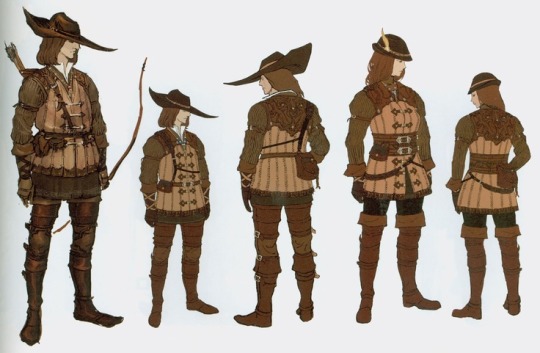
However, in both Dark Souls 2 and Dark Souls 3, the hat becomes unisex, and only 'male' version is featured! 'Female' one is not used again! Nonetheless, the design is still attached to Pharis even in Dark Souls 3:

So, technically it is correct to ignore what model of Pharis looks like in Dark Souls 1, and draw her with 'male' variant of the hat! Or rather, it is the only variant now as they've made sequels! It counts as unisex now!
Or, maybe not? There is some interesting lore attached to the small variant with the feather that went unused in Dark Souls 2 though. Pharis never got to have unusual birb companion. :pensive:

But also, how about the idea that whoever Coco is existed in Dark Souls 1 times, maybe/likely even without being companion of Pharis! So, Pharis used to wear the 'female'/feather variant of the hat, and maybe so were many other hunters! Hunters that believed in good luck in hunt by placing the feather in their hats, and Pharis was one of such people!
But, only later Pharis replaced the "superstition feather" hat with their own, new, unique hat! We can always have both if we know how to work with what we're given!
_________________________
So yeah, Pharis/Evlana canonically can be any gender! I for one really like female Pharis as sort of a prototype to Dolores, the GNC archer lady from Elden Ring! But yes as you can see, the only "evidence" is the name, and in Fromsoft's case, it means nothing!
#dark souls#dark souls 1#pharis the heroic archer#dark souls 3#evlana goddess of the hunt#dark souls reference#dark souls observation#screenshots#I needed to get to the bottom of this
12 notes
·
View notes
Text

山吹[Yamabuki] Kerria japonica
太田左衛門太夫持資は上杉憲政(政真)の長臣なり。鷹狩に出で雨に合ひ、ある小屋に入りて蓑をからんといふに、わかき女の何とも物をばいはずして、山ぶきの花一枝折りて出しければ、「花を求るに非ず」とて怒て歸りしに、是を聞し人のそれは「七重八重花はさけども、山ぶきのみのひとつだになきぞ悲しき」といふ古歌のこゝろなるべしといふ。持資おどろきてそれより歌に志をよせけり。
[Ōta Saemon-no Taifu Mochisuke wa Uesugi Norimasa(Masazane) no chōshin nari. Takagari ni ide ame ni ai, aru koya ni irite mino wo karan to iu ni, wakaki onna no nan tomo mono woba iwazu shite, yamabuki no hana hito eda orite idashi kereba, "Hana wo motomuru ni arazu" tote ikarite kaerishi ni , kore wo kikishi hito no sore wa, "Nanae yae hana wa sakedomo, yamabuki no mi no(mino) hitotsu da ni naki zo kanashiki" to iu koka no kokoro naru beshi to iu. Mochisuke odorokite sore yori uta ni kokorozashi wo yose keri.] Ōta Mochisuke is a senior member of Uesugi Norimasa(Masazane)'s family. When he went a falconry and got caught in the rain, he went into a hut to borrow a mino, straw raincoat. A young woman, without saying a word, broke off a branch of yamabuki flowers and offered it to him, then he said, "I did not ask for flowers," and left angrily. Someone who heard this said that (she must have conveyed) the heart of the old waka poem, "Seven and eight flowers bloom, but yamabuki is sad because it does not bear even a single fruit (Another meaning: I am young and look like this, but poor and alone, I sadly do not have even a mino, single straw raincoat. * 身の一つだに[mi no hitotsu da ni] could also mean "I am alone, so...") He was shocked and began to study waka poetry after that.
雪玉實隆の歌に、「雨にきるみのなしとてや山吹の露にぬるゝは心つかしを」、後拾遺和歌集、「小倉の家に住侍るころ雨ふり侍りける日、みのかる人の侍りければ、山吹の枝を折てとらせ侍りけり。心もえでまかり過て」、又の日「山吹心得ざるよし」いひおこせて侍りける、返しにいひ遣しける、兼󠄄明親王、「七重八重はなはさけども山吹のみのひとつだになきぞかなしき(あやしき)」。
[Setsugyoku Sanetaka no uta ni, "Ame ni kiru mi no(mino) nashi tote ya yamabuki no tsuyu ni nururu wa kokorozukaji wo", go-shūi waka-shū, "Ogura no ie ni sumi haberu koro ame furi haberi keru hi, mino karu hito no haberi kereba, yamabuki no eda wo orite torase haberi keri. Kokoro mo ede makari sugite", mata no hi "Yamabuki kokoroezaru yoshi" ii okosete haberi keru, kaeshi ni ii tsukawashi keru, Kaneakira-shinnō, "Nanae yae hana wa sakedomo yamabuki no mi no(mino) hitotsu da ni naki zo kanashiki."] In Sanjōnishi Sanetaka's private collection of poetry, Setsugyoku-shū, "Yamabuki, which has no fruit (no mino, straw raincoat, to wear) in the rain, does not mind getting wet with dew." And in Go-shūi Waka-shū, Later Collection of Gleanings of Waka Poems, "When Prince Kaneakira was living at his house in Ogura, one day it rained and someone came to borrow a mino, straw raincoat, so he broke off a branch of yamabuki and gave it. The person left without understanding why," and on another day (because it was on his mind,) he sent a messenger saying, "I do not understand the meaning of that yamabuki," then Prince Kaneakira responded, "Seven and eight flowers bloom, but Yamabuki is sad because it does not bear even a single fruit (Another meaning: I am a member of the royal family but living in the mountain and poor, so I do not have even a mino, single straw raincoat. * 九重[Kokonoe], ninefold, means the Imperial Palace) From 常山紀談[Jōzan kidan] by 湯浅 常山[Yuasa Jōzan](1708-1781) Source: https://dl.ndl.go.jp/pid/908050/1/10 https://en.wikipedia.org/wiki/Ōta_Dōkan
山吹[Yamabuki] and 山葺[Yamabuki](葺 means thatch, and this could also be read as an abbreviation for "Poor house in the mountain Ogura"), 蓑一つ[Mino hitotsu](One straw raincoat) and 実の一つ[Mi no hitotsu](Only one fruit) and 身の一つ[Mi no hitotsu](The body alone). Such a technique of expression is called 掛詞[kakekotoba]. https://en.wikipedia.org/wiki/Kakekotoba
Whether this is a true story or not is not certain, but it is a well-known anecdote. https://ccdl.claremont.edu/digital/collection/cyw/id/351
The double-flowered yamabuki does not bear fruit. However, this is a horticultural variety. I do not know if it existed in the distant past. I think this expression perhaps mean that there are many single-petaled flowers. The single-petaled yamabuki produces inconspicuous fruits, though.
15 notes
·
View notes
Text
【 秋の七草 】
春の七草はお正月の恒例として根付いていますが、 特に行事がないためか、秋の七草はあまり注目されることはないようです。

一年の健康を祈り、疲れた胃を休めるとされる「食べる」春の七草に対して、 秋の七草は食べるのではなく「愛でる」ものとされますが、 薬効成分がある実用的なものだそうです。
秋の七草の由来は 万葉集に収められている山上憶良のこの2首の歌とされています。 「秋の野に 咲きたる花を 指折り かき数ふれば 七種の花」 「萩の花 尾花 葛花 撫子の花 女郎花 また藤袴 朝貌の花」
覚え方としては五七五七のリズムで、 「ハギ・キキョウ クズ・フジバカマ オミナエシ オバナ・ナデシコ」 というのが良いようです。
秋の七草廃線を隠し���ふ 鷹羽狩行

5 notes
·
View notes
Text
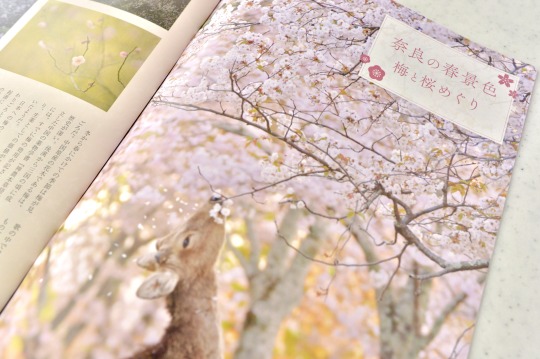
【お知らせ】 「月刊奈良3月号」 梅と桜特集で写真を掲載頂きました♫ 今年は梅の開花が早く 1枚今年撮ったのがある🤭 🦌ちゃんはピンぼけではなくブレです😄
他、宇多上皇の交野への鷹狩り(野行幸)で 菅原道真がかの有名な 「このたびは幣もとりあえず手向山〜」 と詠んだ行き当たりばったりの旅、 大和内の道中の様子を興味深く読みました😊
7 notes
·
View notes
Quote
江戸時代に彦根藩第二代藩主井伊直孝(藩主1602年 - 1659年)が、鷹狩りの帰りに弘徳院という小寺の前を通りかかった。その時この寺の和尚の飼い猫が門前で手招きするような仕草をしていたため、藩主一行は寺に立ち寄り休憩した。すると雷雨が降りはじめた。雨に降られずに済んだことを喜んだ直孝は、寛永10年(1633年)、弘徳庵に多額の寄進をし井伊家の江戸の菩提寺と定め、弘徳庵は大寺院の豪徳寺となった。歴代藩主や正室の半数ほどの墓所が存在し、幕末の藩主で桜田門外の変で暗殺された大老井伊直弼の墓も豪徳寺にある。 和尚はこの猫が死ぬと墓を建てて弔った。後世に境内に招猫堂が建てられ、猫が片手を挙げている姿をかたどった招福猫児(まねぎねこ)が作られるようになった。 また、同じ豪徳寺説でも別の話もある。直孝一行が豪徳寺の一本の木の下で雨宿りをしていたところ、一匹の三毛猫が手招きをしていた。直孝がその猫に近づいたところ、先ほど雨宿りをしていた木に雷が落ちた。それを避けられたことを感謝し、直孝は豪徳寺に多くの寄進をした、というものである。
招き猫 - Wikipedia
2 notes
·
View notes
Text
2024年4月14日(日)

夫婦揃って落語好き、西の推しはもちろん露の新治師匠、東はと言えばやはり柳家小ゑん師匠、発売されているCDはすべて持っている。とは言え、東京の寄席に通うのは難しいので、配信のある落語会のチケットを購入して楽しんでいる。今日も今日とて、4/12(金)の<百年に一度の逸材>と言われる(?)喬太郎師との二人会のチケットを購入した。気持ちをリラックスさせて、来週も授業を頑張ろうではないか。
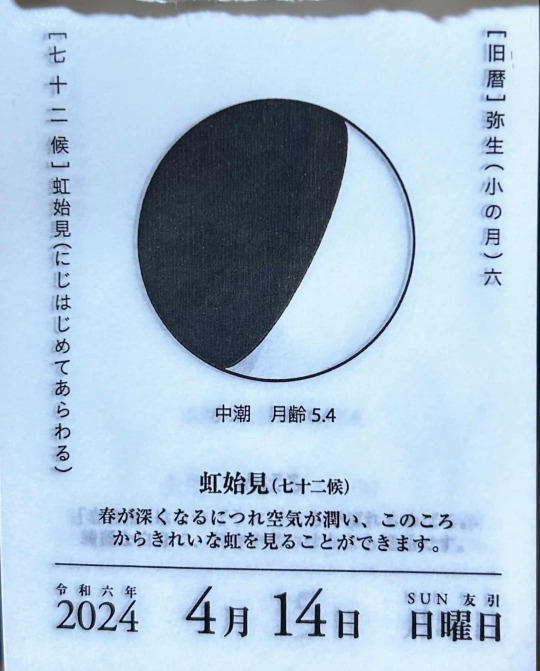
5時15分起床。
日誌書く。
洗濯機を回す。
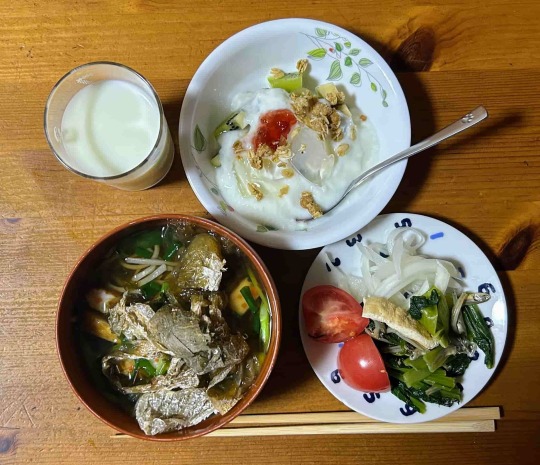
朝食。
珈琲。
<びーんず亭>に珈琲豆発注。
ツレアイは衣類の整理。
私は書棚の整理。
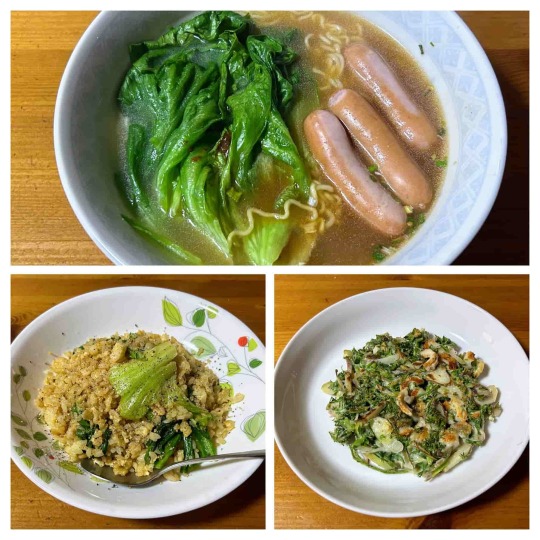
2男はレタス炒飯、ツレアイにはウドのお好み焼き風、3男にはレタスラーメン、私は🍷+おつまみ。
彼女はあちこち買物に走る。
私は空きっ腹にワインが効いてたっぷり午睡。
起きてから慌てて糠床メンテナンス、酢タマネギ仕込む。
夕飯前に、彼女と3男でココに点滴。

今夜も夕飯はさんだかんスペシャル、息子たちにはスパークリングワイン、私たちは賀茂鶴から🍷。
録画番組視聴、サラメシから
害鳥を追い払う鷹(たか)匠のランチ▽蒲田のそば屋で出前メシ
初回放送日: 2024年3月21日 鷹(タカ)匠とは、タカを飼い訓練し狩りをする人たち。この古来の技がカラスやハトなど害鳥対策として注目されている。農家や工場、ゴルフ場などから依頼を受け、鷹匠は定期的タカを飛ばし害鳥を追い払う。その仕事の現場とランチをご紹介。▽出前のバイクについて行き、その場でランチの撮影交渉する突撃企画「出前メシ」。舞台は東京・蒲田の駅近くにある創業45年のおそば屋さん。密着取材から見えた蒲田で働く人の素顔とは。
落語研究会から、柳家さん喬「夢の酒」、三遊亭兼好「犬の目」。
片付け、入浴、体重は2日前から100g増。
パジャマに着替えて日誌書く。
いやぁ、ノンビリとした一日、それだけ5日間の出勤=授業は久しぶりにこたえたのだろう。
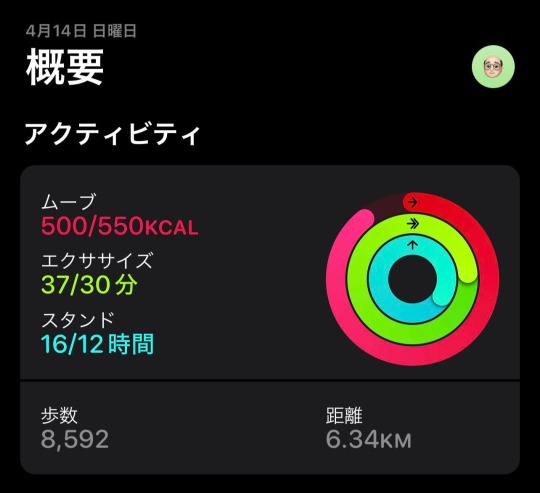
3つのリング完成ならず、明日からは少なくとも平日は頑張ろう。
4 notes
·
View notes
Text
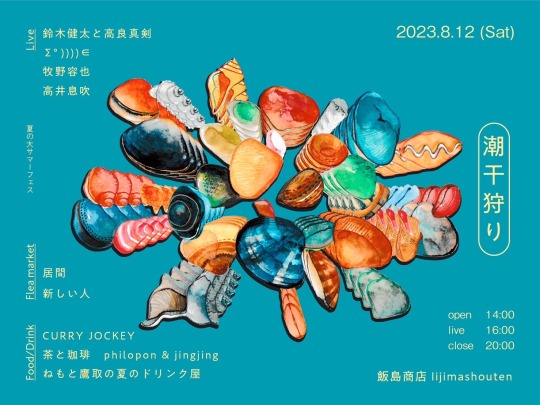
-EVENT- 夏の大サマーフェス「潮干狩り」
日 程 2023年8/12(土) 時 間 open 14:00-/live 16:00-20:00close 出 演 高井息吹 / 牧野容也 / Σ°))))∈ / 鈴木健太と高良真剣 飲 食 CURRYJOCKEY/ねもと鷹取の夏のドリンク屋/ philopon&jingjing 出 店 居間/新しい人 場 所 飯島商店(横須賀中央駅より5分) 料 金 予約 3,000+1D / 当日 3,500+1D
横須賀にある飯島商店で、ねもちゃんと鷹取(山ト波)による夏の大サマーフェス「潮干狩り」を開催します。 楽しいみんなでただ集まって、おいしいご飯食べながら、好きな音楽聴いて、夏休みみたいにダラダラ過ごそうな?っていう回です。合間に抜け出して海に遊びに行ったり、山も近い横須賀の街を堪能するもよしです。疲れたら音楽聴きにまた戻ってきてください。そんな自由な日にしてほしいです。 🌻鷹取愛🌻
はじめまして。今年の4月に東京から、横須賀・飯島商店に引っ越してきました。この家は駅から徒歩2分、市役所まで徒歩1分、海まで徒歩10分です。 早朝にはカラスの鳴き声、昼は工事の音、夜は近所のクラブから重低音がきこえますが、家からはもっといろんな音が聴こえます。 この夏、うちまで夕涼みにきてください。 🌻ねも🌻
.................
-LIVE- 16:00〜20:00
●高井 息吹

5歳からクラシックピアノを始め、吹奏楽やバンドほか、さまざまなスタイルの音楽に触れる。ポップス、ロック、クラシックやジャズ、オルタナティヴミュージックなどに刺激を受け、 19歳頃より本格的にピアノ弾き語りを主軸とした音楽活動を開始。ポカリスエットゼリーを始めにCMへの楽曲提供や歌唱なども行う。2023年2月にnew EP『PIANO』をデジタルリリース。 https://www.takaiibuki.com
.........
●牧野 容也

1984年7月31 日生まれ。愛知県名古屋市出身。 14歳の頃、物置からフォークギターを見つけ、弾き始める。 2005年小鳥美術館を結成(2020 年活動終了)、名古屋を中心に東京、大阪をはじめ全国へ活動を展開。 2016年 Hei Tanaka に加入。2017 年、かねてよりサポートしていた GUIRO に正式加入。 2021年、初のソロ EP「グッド・バイ」をリリース。現在はソロ活動を始め、山口春奈(Dew)などのサポートミュージシャンとしても活動中。https://masayamakino.online/
.........
●Σ°))))∈
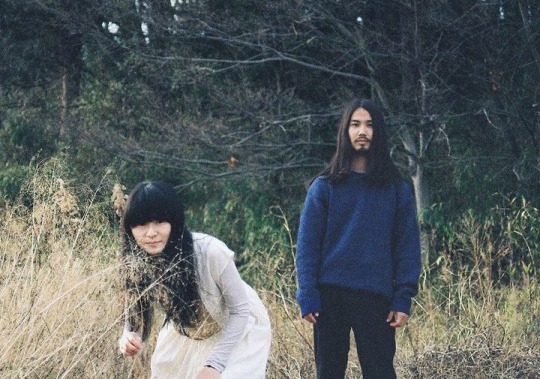
よだまりえ、Nomiによる宅録エレクトロポップユニット。 https://linkco.re/crx8TyMD
.........
●鈴木健太と高良真剣

山二つというバンドで共に音楽をやっています。演劇、展示、古着屋、コントと色々やってきたけど2人で演奏するのはこれが初めてです。 https://www.sz00kn.com/ takaramahaya.com
........................................
-FOOD&DRINK- 14:00〜20:00
●CURRYJOCKEY

通称CJ/出張カレー 各地に赴き、DJのようにその時・その場に合ったカレーをジョックしている。 イベントコンセプトや風土に合わせたカレー表現を得意とし、その場にいる人々がカレーを通じて繋がっていくことに喜びを感じる。 https://www.instagram.com/curry_jockey/
.........
●philopon & jingjing

わたくしたちの茶や珈琲と、わたくしたちの愛する大切な皆さんとの交流の場が、今日もまたはじまります。
.........
●ねもと鷹取の夏のドリンク屋
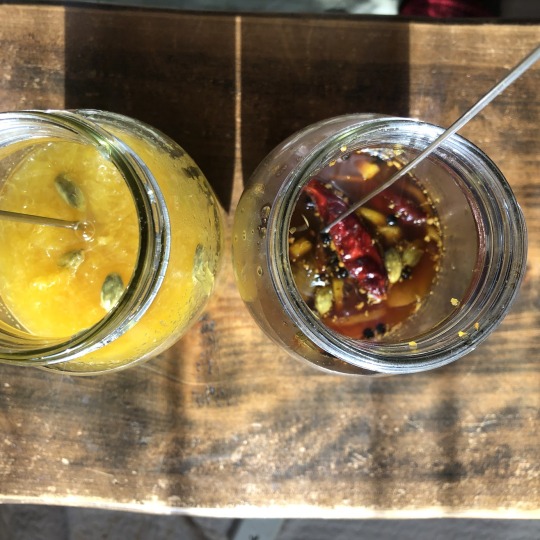
夏のフレッシュジュースやクリームソーダなどおいしいドリンク出します https://www.instagram.com/muimuimai_/ https://www.instagram.com/opantoc/
.................................
-FLEA MARKET- 14:00〜20:00
●居間

かつて北区王子神谷にあったギャラリースペース 居間にあるとうれしい本やたのしい物を販売します https://www.instagram.com/mzk_kwmr/ https://www.instagram.com/iiimmmaaa/
.........
●新しい人

2014年、東京・高円寺に誕生。受け手にスキルとセンスを要求し続けるこの世で最も格好良いガラクタ屋。常に! https://www.instagram.com/yogendelivery/
................
-PLACE-

神奈川県横須賀市若松町1丁目12 GoogleMAP→🗾
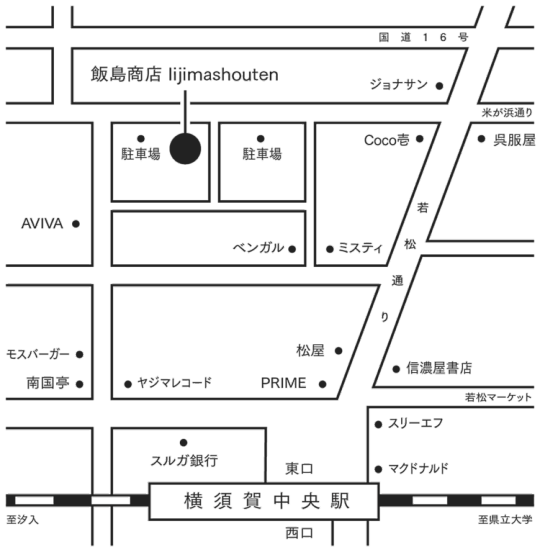
................
-TICKET-
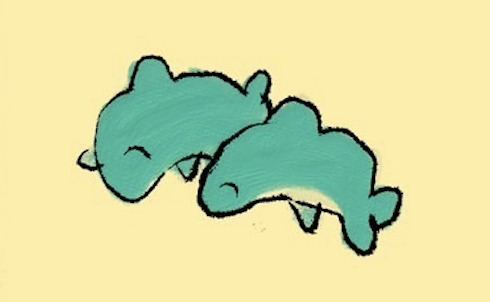
【ご予約】[email protected] 題名「潮干狩り」とし、お名前・人数・連絡先を明記の上、お問い合わせください。 ※当日現金・paypay・クレジット決済となります。 ※3日��っても返信がない場合は、お手数ですが“[email protected]″までご連絡下さい。
2 notes
·
View notes
Text
関東グルメイベント2025春
寒い冬を乗り越え、さらには飛び散る花粉🌼をはね返した者のみが味わえます...春の美味しいイベントの数々🐾。
抹茶🧉メインの貴重なカフェイベント。お茶の水だけにね!
サンシャイン水族館は4月はペンギン🐧、5月はカワウソ🦦をクローズアップして営業中。
お肉🍖とスイーツ🧁が入り乱れる欲張りなイベント、参加しているのは47店舗。
いちご🍓の季節は5月上旬まで。食べ足りない場合は、一年分狩っておくべし。
都内を見下ろしながら👀、台湾料理を口にできる台湾祭。
大人がよってたかってチビっ子👶をけしかけて、泣きわめかせるという血も涙もな���イベント。
全国から集まる餃子🥟の祭典。食べ比べも可能なひたすら餃子のオンパレード。
1 note
·
View note
Text




◆名前:Evan Lyonel(エヴァン・ライオネル) ◆職業:ヴァイオリニスト ◆年齢:17歳 ◆性別:男性 ◆身長/体重:172㎝/47㎏ ◆髪色:ラベンダー ◆瞳色:紫 ◆出身:英国 ◇誕生日:11月7日(蠍座) ◇血液型:AB型 ◇利き手:左利き ◇家族構成:両親、弟 ◆特徴表: 2−2 影が薄い 2−5 鋭い洞察力 一人称:僕、私 二人称:君、貴方 三人称:呼び捨て、ミスター・ミス、○○さんくん 物腰丁寧。話しかけられれば一見して穏やかな好青年のように 振る舞うが、人前でも話しかけられなければ基本は無表情。 誰に対しても黙って微笑んでいれば 大体やり過ごせるのでそうしているというだけ。 ミステリアス気味で何を考えているのか分からないとよく言われる。 本当の意味で心から笑ったことがほとんどない。 趣味はヴァイオリンと鷹狩り。 ヴァイオリンは、 音楽なら人と関わらずとも自分の世界に浸れるから。 孤独感が爆発すると深夜だろうと明け方だろうと 時間を問わず衝動的に弾き始める。 鷹狩りは父親とやっていたのでその延長。 今でも週末にたまに父が迎えにくるので 一緒に鷹狩りに出かけている。 ▷鷹やハヤブサは高貴な鳥として高値で売買されていた。 それゆえ鷹狩りは〈王者の狩り〉とも呼ばれる。 ◆通過シナリオ 2025.0114 FRaTRlCiDE-フラトリサイド-(HO3) 2025.0228 REGlCiDE-レジサイド-
0 notes
Text
佐々木敦 石川淳
たとえば『紫苑物語』の冒頭「国の守は狩を好んだ。」とか、『鷹』の「ここにきりひらかれたゆたかな水のながれは、これは運河と呼ぶべきだろう。」とか、『荒魂』の「佐太がうまれたときはすなわち殺されたときであった。」とか、『至福千年』の「まず水。」なんかは何十年も読み返してないのに今もそらで言える(だが音で記憶していて字面がわからないので確認した)。『至福千年』は「そりゃ言えるだろ」と思うかもしれないが、その続きの「その性のよしあしはてきめんに仕事にひびく。」も憶えている。
0 notes
Text
「鷹のおでまし 鷹狩の美術」展

埼玉県立歴史と民俗の博物館で「鷹のおでまし 鷹狩の美術」展を見る。埼玉県は旧国名でいうと武蔵国に含まれ、武蔵国ではかつて鷹狩がよく行われていたことから、鷹と鷹狩に焦点を当てて開催された特別展である。
まず初めに剥製の鳥の皆さんに出迎えられる。下の2点は鷹狩で使用された代表的な鷹の一種、オオタカの成鳥(左)と幼鳥(右)。


オオタカの羽根標本。羽根そのものも美しいが、その並べかたにこだわりを感じる。

以下は獲物にされた鳥の皆さん。順にコサギ、コガモ、シラコバト。シラコバトは埼玉県の「県民の鳥」に指定されているそう。



このあと展示本番となる。日本最古の鷹狩の記述は、日本書紀第11巻の仁徳天皇の鷹狩とのこと。天皇や公家、のちには武家もたしなむようになった鷹狩だが、鎌倉幕府は鷹狩禁止令をたびたび出した。御家人の間で鷹狩が盛んだったことを窺わせるが、鷹の飼育は禁じなかったようなので、狩りが武威につながることを警戒したもののようである。
鷹は武家の間で贈答品などとしてコミュニケーションツールになっていた。また江戸時代になると幕府によって鷹狩が体系化され、御留場(禁猟区)、御拳場(将軍の狩場)、御三家鷹場(御三家や有力大名のための鷹場)、捉飼場(鷹の訓練や餌鳥調達のための鷹場)が整備された。
支配階級の間で重要視されるものは当然のごとく絵の題材にもなる。鷹を画題とした絵には3通りあり、止まり木の上の鷹を描く「架鷹図」、獲物を襲う鷹を描く「鷙鳥図」、鷹狩の模様を描く「鷹狩図」とのこと。3つめの鷹狩図は絵巻物が多いそう。たしかにある瞬間をとらえればよい架鷹図や鷙鳥図とは異なり、鷹狩図ではさまざまな場面を描くために絵巻物の形式のほうが向いていそうだということは想像しやすい。画題によってメディアが適切に使い分けられる例と言えそうである。

撮影可能だったのは下記の作品。
「鳥小屋図屏風」。狩野派の絵師による作品とみられる。右隻に子育て中の鷹が描かれている。

長谷川等意「狗鷹図」。

橋本雅邦「鷹捕白鷺図」。

「犬に鷲図」。タカでなくワシだが、この展覧会の文脈で何故ワシの絵が選ばれているのかについては特に注釈がなかった。

狩野雅信「日出瀧松鷹図」。鷹がおめでたいモチーフとして扱われている。

自分が訪れた日には、「鷹匠のおでまし」と題して鷹匠および鷹の皆さんによるデモンストレーションが行われた。
1 note
·
View note
Text
「優雅さとスピードの融合:ボルゾイの魅力を徹底解剖!」
犬種「ボルゾイ」は、その優雅な姿と鷹揚な性格で知られています。そして、彼らの美しさと独特の動きは、まるでロシアの大地を駆け抜ける詩のようです。🐕🦺✨ ### ボルゾイとは? まず、ボルゾイの起源を少しお話ししましょう。ボルゾイはロシアの貴族たちによって開発された狩猟犬で、その歴史は古く800年以上も遡ることができます。クラシックな貴族の象徴であり、その豪華な被毛と優美な姿はまさに貴族の犬といった風情です。 ### 優雅さを保つための日常のマナー ボルゾイを飼うにあたって、彼らのエレガントな姿を保つためのマナーを習得することが大切です。以下は、そのためのポイントです。 #### 1. 体形管理:…
0 notes